- Home
- Kristin Harmel
Life Intended (9781476754178) Page 13
Life Intended (9781476754178) Read online
Page 13
“We did. But it was the baby thing that drove a wedge between us in the first place. I just don’t want that to happen with you.”
I stare at him. “I wish you’d told me.”
He shrugs. “Yeah, well, you don’t spend a lot of time talking about Patrick, either. The past is the past, Kate.”
“Except it’s not,” I hear myself say. Dan looks at me quizzically, and I shrug. “What I mean is, the past isn’t gone. It’s what brought us here. So what happened with Siobhan, what happened with Patrick, those are things that matter.”
“But you shut down every time we start to talk about anything serious,” Dan says softly. “You won’t talk about the past. You won’t talk about the future.” He pauses. “I’ve been trying so damned hard, Kate, to just focus on the here and now. But now it seems like you’re angry at me for that.”
“I’m not angry at you,” I say, but I know that’s not true. There’s been something dark simmering beneath the surface lately, and I have the uneasy feeling that it’s because deep down, I’m irritated at Dan for not being Patrick. I wasn’t supposed to grow old with this golden boy who does everything right. I was supposed to have a big, messy, brilliant life with a man whose flaws were as endearing as everything else about him. It’s just not fair.
“Yeah, well, you’re never angry, are you?” His tone, suddenly sharp, stings. “But you’ve been on edge with me ever since you found out about your infertility. Like it was my fault.”
“It’s not your fault.” My answer is automatic. “Of course it’s not.”
“I know that,” Dan says. “I’m just not so sure you do.”
I bite my lip and look at my hands. “I’m just not ready to close the door on having kids.”
“Kate—” Dan begins, but I cut him off.
“No. I need to say this. I don’t think I knew how much I wanted to be a mother until I found out I couldn’t have a child,” I say in a small voice. “And I know we should have discussed this before now, and maybe it’s my fault for not doing that. But now . . . Well, maybe that’s why I’m dreaming of having a daughter. I know it doesn’t sound logical. But I want to be a mom, Dan. I really, really do. I think that’s what I was supposed to be all along.”
He’s silent for a minute. “So what are we talking about? Adoption?”
I nod, holding my breath.
“Baby, you’re forty,” Dan says without looking at me. “I’m forty-five. By the time we went through the whole process of getting a child . . . Well, I just don’t want us to be old parents.”
“So maybe we could adopt a child who’s a little older.”
“Or we could admit that maybe your infertility is a sign.” His tone is gentle, but his words make me cringe. “Maybe it’s fate telling us parenthood isn’t in the cards for us.”
“But—”
“It’s just that I’ve seen too many of our friends’ marriages ruined because of issues related to their kids,” he interrupts. “And those are their biological kids.”
The words make me bristle. “An adopted child wouldn’t be any less ours.”
“I don’t mean it like that. I just mean they could come with extra complications.”
“So could a child we give birth to, Dan,” I shoot back. “Maybe life isn’t supposed to be a cakewalk. Maybe the greatest things in life come from the greatest challenges. Kids complicate things. That’s just the way it is. But the complications are all worth it in the end. Why are you refusing to see that?”
“I’m not refusing to see anything, Kate! I’m just expressing my point of view.”
“But you say it like it’s a final decision! Like I don’t have the right to an opinion!”
“You have the right to an opinion, of course,” he says with a dramatic shrug. “But that doesn’t make you correct.”
I stare at him. “So now I’m wrong because I feel differently than you?”
“No, you’re wrong because you can’t just change course midstream.”
“I’m not changing course, Dan! I never made my mind up in the first place.”
He looks at me for a minute. “You seriously think that we wouldn’t be terrible parents, Kate? We love to eat out and travel and buy nice clothes and drink nice wine. Where’s there room in that kind of lifestyle for a kid?”
“Those are your things, not mine,” I reply softly. “And no, Dan, I don’t think I’d be a terrible parent.” I think about the way I love Hannah so much in the dreams, the way my insides flip-flop with joy every time I look at her, the way she’s turned out to be such a sweet kid. “I think I’d be a good mother, actually.”
“Too bad your ovaries don’t agree.”
My mouth falls open, and I stare at him, wide-eyed and wounded.
“Shit, I’m sorry,” he says immediately. “I don’t know why I said that.”
But I don’t reply. Instead, I turn to stare out the window, blinking back tears. The streets below are still full of people enjoying the warm summer afternoon. A couple walks by holding hands; a woman in shorts and a tank top pushes a stroller and tugs a wobbling toddler behind her; two teenage girls decked out in leather and lace slouch past. My eyes fix on a man carrying a smiling little boy on his shoulders; the boy has a baseball glove on his left hand and a Yankees cap on his head, and he’s chattering excitedly about something while the man listens, his expression amused.
“What if I already had a child?” I ask, almost without meaning to.
“What?”
“When you met me, I mean,” I say, turning back to Dan. “If Patrick and I had had a child together before he died. If I was a single mom, would you have still asked me out?”
Dan looks at me for a minute. “Honestly, I don’t think so. But Kate, it’s a moot point. So let’s just be glad that wasn’t the case, okay?”
Wordless, I nod.
It’s not until we get into bed that night, Dan wrapping his arms around me and murmuring that he loves me, that I realize we haven’t really decided anything at all. We talked circles around the subject and then retreated back to our own corners, just like we always do. Maybe that’s what I’ve been doing for a long time now—walking a road to nowhere because it’s easier than letting go of the past.
Finally, I drift off to sleep, the face of the Hannah lookalike from the wedding shop window imprinted on my mind.
Fifteen
The next morning, I know before I even open my eyes that I’m back in my life with Patrick once again. The light is brighter here, the scent of the sheets familiar in a different way, the sounds of the street outside distinct from the sounds of the Murray Hill apartment I share with Dan.
“Morning,” I say, opening my eyes and rolling over to face my husband, whose face is illuminated by the sunlight streaming in. He looks like an angel, I think for a fleeting second before I realize just how on the nose I am.
This time, though, the dream—or whatever it is—is different. It still feels incredibly real, but there’s a milky fog filling the room; it reminds me of being in an airplane slicing through a wispy cloud. For the first time, I wonder fleetingly if I’m in heaven. But I push the idea quickly away, because that would mean Hannah’s dead too. And she can’t be dead, because she doesn’t exist. Patrick’s eyelids twitch a bit, and he slowly opens them, blinking into the morning light for a second before focusing on me. “Katielee,” he murmurs, leaning forward to kiss me sweetly on the lips. “Is your head feeling better?”
“My head?”
“The headache you had last night,” he says, raising an eyebrow.
The problem with getting only glimpses into this world is that I miss so much of the in-between. But obviously, even though I can’t recall most of it, I am somehow in this dream world on a regular basis. Life seems to keep happening here with me in it. This both confuses me and makes me feel deeply sad.
; “Yes,” I manage. “My head’s fine.”
Patrick smiles at me, then glances at the clock. “Well, up and at ’em. We’ve got Hannah’s recital this morning.” He kisses me again then gets out of bed. I watch as he slips on a pair of pajama pants over his boxer briefs and pulls a white T-shirt over his head. “You want to handle Hannah’s good luck pancakes? Or should I?”
I’m silent for a second as the information rushes in. I know in an instant that Patrick’s referring to a piano recital, that Hannah adores her teacher, who goes by Miss Kay, and that she’s excited about the Beethoven piece she’ll be performing. I’m so startled by the sudden influx of knowledge that I manage only a confused, “Um . . .”
“Okay, I’ll do it. You just get dressed.” Patrick disappears out the bedroom door before I can reply, and in a few seconds, I can hear clattering in the kitchen as he takes the frying pan out of the cabinet.
I climb out of bed and open the closet door. I’m strangely unsurprised to find that my clothes are a mix of items I have in my real life and items I’ve never seen before. It makes sense, doesn’t it? If this is an alternate reality, I would have seen some of the same clothes in the stores and found them desirable, simply because I’m the same person with the same tastes.
But am I the same person? It occurs to me how much losing Patrick changed me. In this dream world, maybe I’m carefree, happy, a person who throws caution to the wind and who doesn’t know yet that the smallest moment can twist your life into something unrecognizable. I hope I am. That’s who I was before Patrick died and the world shifted on its axis.
I pull out a dress that catches my eye; it’s tea length and flowy and made of a silky fabric of deep purple and forest green swirls. I love it, but in my real life, I never would have bought it, because Dan would have laughed and called it “hippy dippy.” I swallow a sudden surge of annoyance, throw the dress on quickly, add some strappy sandals, and head to the bathroom to wash my face and put on some makeup.
When I head into the kitchen a few minutes later, Hannah’s already at the table, dressed in a blue dress and black Mary Janes with low heels. She smiles when she sees me. “Morning,” she says aloud, then asks in sign language, Is your head better?
Yes, I sign back by nodding my right hand while I nod my head. Thank you.
Patrick winks at me as he approaches with a pan full of pancakes. “Blueberry and peanut butter, you weirdos,” he says, flipping several onto Hannah’s plate and two onto mine.
We both make faces at him, and as Hannah digs in to her breakfast, I carefully sign, You look beautiful.
She grins and signs back Thank you while nodding and smiling. I mirror the sign, because I know from Andrew that although its meaning is closer to saying thank you in return, it’s also a common way to indicate the phrase You’re welcome. I glance over at Patrick, who’s standing at the stove, watching us closely.
Love you, he mouths to me, and it hurts my heart so much that for a few seconds I can’t breathe.
“So,” I say, turning back to Hannah and forcing myself to act normal. “Are you ready for this recital or what?”
“Mom!” she says aloud, rolling her eyes at me. “You know I’ve been practicing every day for a month.”
“Right. Of course.” I know somehow that she’s good. Really good. And she’s serious about it. I also know suddenly that she’s been playing since she was three, that I took her to her first lesson six months after she got her cochlear implants because I wanted her to be exposed to music, and that Patrick and I fought about it at first, because he thought we would be influencing her interests by pushing her into something she hadn’t asked for on her own.
It reminds me suddenly that in real life, Patrick and I used to fight sometimes, big and messy. Sometimes we’d argue about the important things—where we’d live, who we were spending the holidays with—but other times, it would be about something small and stupid, like who left the lid off the mayonnaise jar. And I hadn’t been scared to argue with him, because I’d never feared him walking away.
So why am I so scared to fight with Dan now? Or with anyone in my life, for that matter? I’ve spent the last decade thinking of myself as even-tempered and reasonable. But what if I’ve just been a chicken? What if I’m so terrified of losing the people I love that I’ve been slowly giving away pieces of myself just to avoid confrontation?
“Uh, hello? Earth to Mom.”
I snap back to the conversation I’m having with Hannah and shoot her an embarrassed smile. “Sorry, honey.”
She makes a face at me and signs, You’re being weird again.
Patrick joins us at the table, and when I’m finished eating, he grabs my right hand with his left and holds it clasped in his lap while he eats. I squeeze back and hope he knows what I’m saying: that this moment, the three of us here together, is perfect. I never want it to end.
Get dressed, Dad! Hannah signs, jumping up from the table. We’re going to be late!
“Do the dishes, kiddo,” he replies. “I’ll be changed in a minute.” She nods and heads over to the sink, while Patrick beckons for me to follow him.
I sit on the edge of the bed while he strips off his T-shirt and pajama pants. Desire sparks in my belly again, and I have to remind myself that we’re running short on time, that we have to leave soon. Still, I can’t stop myself from longing for him.
I watch as he pulls on khakis then grabs a white linen shirt from the closet and buttons it over his chest. “You look amazing,” I murmur.
He smiles. “I was going to say the same to you. You get more beautiful with every passing year, you know.”
I snort. “No, I get older and heavier and more wrinkled.”
He rolls his eyes. “First of all, that’s not true. Secondly, getting older is beautiful, because that’s life.”
“Right,” I murmur. “Life.” I feel guilty and foolish for ruing the things that are merely evidence of a life being lived.
“I’m sorry, Patrick,” I whisper into the silence after he leaves the room.
Outside, we pile into a cab and I try to memorize the address Patrick gives the driver—321 Bleecker Street—so that I can find it later in the real world. It turns out to be a second-floor studio with hardwood floors, big beamed ceilings, and three dozen mismatched folding chairs set up facing a single piano at the front of the room. When we walk through the door, Hannah hugs us both quickly, then she bounds off to where two other teenage girls are deep in conversation. One of them high-fives her, and the other greets her with a friendly smile.
“What is this place?” I whisper. Patrick gives me an odd look and the room fades a little, so I force an innocent smile as I wait for my mind to load all the details I’m somehow already familiar with. And just like that, I suddenly know that this is the studio of a woman named Dolores Kay and that Hannah loves it here. “What I meant is, it’s a beautiful place,” I amend, and the room comes back into focus.
Patrick nods. “Miss Kay has done a great job.”
Just then, a tiny, elfin woman in her sixties with a salt-and-pepper pixie cut and a black shift dress interrupts our conversation by banging a few of the keys on the piano until the room quiets down.
“Welcome, welcome, friends and parents!” she chirps in a British accent. “For those of you who don’t already know me, I’m Dolores Kay, and of course this is our annual summer recital! Now let’s find some seats and we’ll get started!”
She strides purposefully toward the cluster of girls that includes Hannah, and Patrick and I find seats in the second row. “Save that one for my mom,” he says, nodding to the seat beside mine. He checks his watch. “She should be here any minute now.”
“Your mom’s coming?” I ask with a smile. I hadn’t expected to encounter anyone real in this dream world, but seeing Joan will ground this fantasy in at least some degree of reality. I’m surprised by how elated
this makes me feel.
“Of course,” Patrick says, and as if on cue, the door in the back of the room swings open, and Joan enters. For a moment, as she walks toward us, all I can do is stare.
“What’s wrong with her?” I whisper to myself just before Joan arrives beside us, leaving Patrick only enough time to look at me in confusion. But before the words are even out of my mouth, I already know. Breast cancer. Stage 2. Diagnosed two and a half months ago after I insisted she get a mammogram. I run my thumb over the healing cut on my fingertip and worry: If Joan is sick in this dream world, what if she has breast cancer in the real world too?
Her cheekbones jut out, and she looks gaunt and drawn. “Hi, you two!” she says, beaming at us. She pecks me on the cheek first before planting a kiss on Patrick’s forehead. Then she surprises me by pulling her loosely wrapped red scarf down, revealing a fully bare head. “It’s too darned hot for this thing!” she exclaims, fanning herself with an issue of the New Yorker she pulls from her purse. “I’ll tell you what, the one good thing about cancer is that I get to feel the cool breeze on my head in the summer.” She winks at me and adds, “Ever the optimist, right?”
I continue to gape until Patrick nudges me, which snaps me out of it. “Joan,” I murmur, and then I can’t continue, so I settle for pulling her into a tight hug. I can feel her bony frame through her baggy shirt. “Are you okay?”
“Oh, I’m feeling fine, Kate,” she says with a sigh. “Today happens to be one of the good days. The chemo’s just a little harder on my body than I thought it would be. But you know that. I must sound like a broken record to you, sweetheart.”
I take a deep breath, trying not to cry. I want to say more, but Miss Kay claps her hands then and brings the recital to order by introducing the first student to perform, a girl named Hira who looks about Hannah’s age. As Hira plays Bach’s Prelude No. 1 in C Major, stumbling over a few notes here and there but staying in rhythm, my mind whirls. I have to call Joan as soon as I wake up. I have to make sure she’s okay. I almost don’t notice the corners of the room going fuzzy.

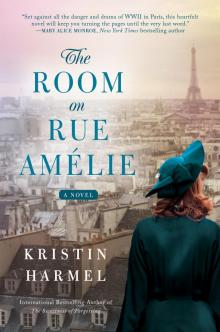 The Room on Rue Amélie
The Room on Rue Amélie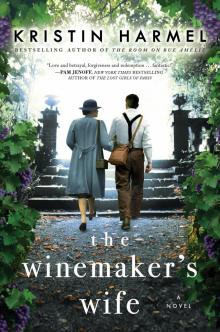 The Winemaker's Wife
The Winemaker's Wife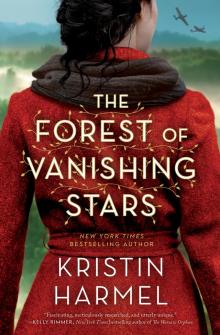 The Forest of Vanishing Stars
The Forest of Vanishing Stars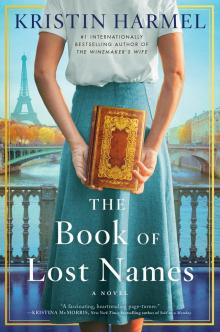 The Book of Lost Names
The Book of Lost Names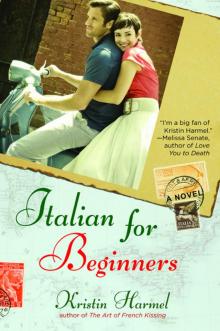 Italian for Beginners
Italian for Beginners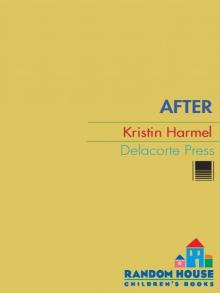 After
After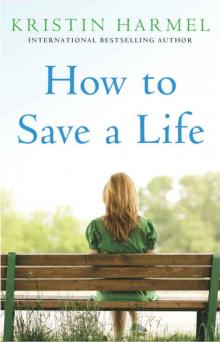 How to Save a Life
How to Save a Life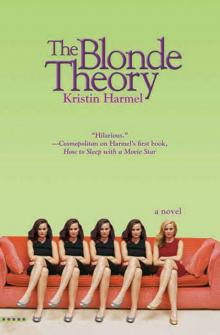 The Blonde Theory
The Blonde Theory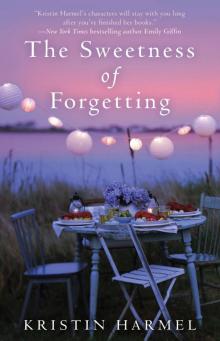 The Sweetness of Forgetting
The Sweetness of Forgetting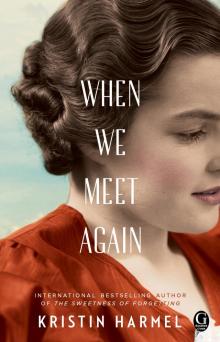 When We Meet Again
When We Meet Again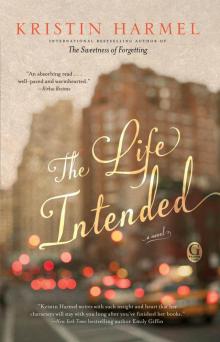 Life Intended (9781476754178)
Life Intended (9781476754178)